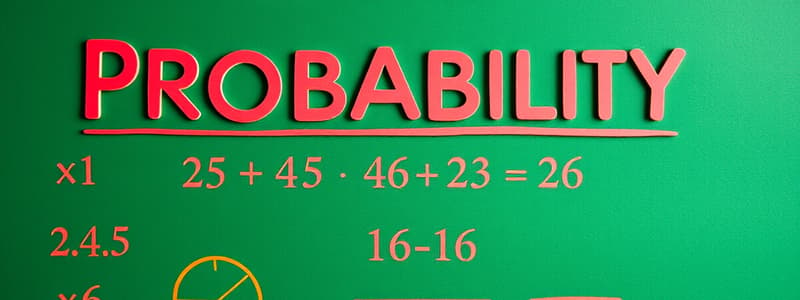Podcast
Questions and Answers
Which of the numbers that follow could represent a probability? I. 17/15 II. 0.1
Which of the numbers that follow could represent a probability? I. 17/15 II. 0.1
- only I
- neither
- both I and II
- only II (correct)
Which of the numbers that follow could represent a probability? I. 50% II. 35%
Which of the numbers that follow could represent a probability? I. 50% II. 35%
- only II
- neither
- both I and II (correct)
- only I
If a die is rolled one time, find the probability of getting a number greater than 6.
If a die is rolled one time, find the probability of getting a number greater than 6.
- 5/6
- 0 (correct)
- 1
- 1/6
If a die is rolled one time, find the probability of getting a number less than 4 or an even number.
If a die is rolled one time, find the probability of getting a number less than 4 or an even number.
A box contains five blue, eight green, and three yellow marbles. If a marble is selected at random, what is the probability that it is not blue?
A box contains five blue, eight green, and three yellow marbles. If a marble is selected at random, what is the probability that it is not blue?
In a classroom, the students are 14 boys and 4 girls. If one student is selected at random, find the probability that the student is a girl.
In a classroom, the students are 14 boys and 4 girls. If one student is selected at random, find the probability that the student is a girl.
Of the next 33 trials on the docket in a county court, 4 are homicides, 11 are drug offenses, 7 are assaults, and 11 are property crimes. If jurors are assigned to trials randomly, what's the probability that a given juror won't get a property crime case?
Of the next 33 trials on the docket in a county court, 4 are homicides, 11 are drug offenses, 7 are assaults, and 11 are property crimes. If jurors are assigned to trials randomly, what's the probability that a given juror won't get a property crime case?
Evaluate 8!
Evaluate 8!
Evaluate the expression (4!)(3!)
Evaluate the expression (4!)(3!)
Evaluate the expression 8!/4!2!
Evaluate the expression 8!/4!2!
How many different ways can 3 people stand in line at a cash register?
How many different ways can 3 people stand in line at a cash register?
Evaluate 10P4.
Evaluate 10P4.
A. In how many ways can the letters in the word TEXAS be arranged? b. In how many ways can the letters in the word OHIO be arranged?
A. In how many ways can the letters in the word TEXAS be arranged? b. In how many ways can the letters in the word OHIO be arranged?
Decide whether the selection described is a combination or a permutation. Five club members are chosen to serve on a committee.
Decide whether the selection described is a combination or a permutation. Five club members are chosen to serve on a committee.
Decide whether the selection described is a combination or a permutation. Three prizes are given to the winners of a race.
Decide whether the selection described is a combination or a permutation. Three prizes are given to the winners of a race.
Find both the number of combinations and the number of permutations for the given number of objects. 10 objects taken 7 at a time.
Find both the number of combinations and the number of permutations for the given number of objects. 10 objects taken 7 at a time.
How many ways can a committee of 3 people be selected from a group of 8 people?
How many ways can a committee of 3 people be selected from a group of 8 people?
How many different ways can a college select three applicants for a teaching position from a pool of 20 applicants?
How many different ways can a college select three applicants for a teaching position from a pool of 20 applicants?
A teacher has 20 boys and 10 girls in her class. In how many ways can she select 6 of the children to be in a play if she must select 3 boys and 3 girls?
A teacher has 20 boys and 10 girls in her class. In how many ways can she select 6 of the children to be in a play if she must select 3 boys and 3 girls?
How many ways can a person select four books, two CDs, and one DVD from ten books, twenty CDs, and five DVDs?
How many ways can a person select four books, two CDs, and one DVD from ten books, twenty CDs, and five DVDs?
Draw a tree diagram to determine the sample space when three coins are tossed.
Draw a tree diagram to determine the sample space when three coins are tossed.
Three coins are tossed. Find the probability that exactly two coins land tails up.
Three coins are tossed. Find the probability that exactly two coins land tails up.
Three coins are tossed. Find the probability that all the coins land heads up.
Three coins are tossed. Find the probability that all the coins land heads up.
Three coins are tossed. Find the probability that two or more coins land heads up.
Three coins are tossed. Find the probability that two or more coins land heads up.
Three coins are tossed. Find the probability that no more than one coin lands heads up.
Three coins are tossed. Find the probability that no more than one coin lands heads up.
A single card is drawn from an ordinary 52-card deck. Find the probability of getting a 4 of diamonds.
A single card is drawn from an ordinary 52-card deck. Find the probability of getting a 4 of diamonds.
A single card is drawn from an ordinary 52-card deck. Find the probability of getting a black card.
A single card is drawn from an ordinary 52-card deck. Find the probability of getting a black card.
A single card is drawn from an ordinary 52-card deck. Find the probability of getting a 7.
A single card is drawn from an ordinary 52-card deck. Find the probability of getting a 7.
A single card is drawn from an ordinary 52-card deck. Find the probability of getting a red 6.
A single card is drawn from an ordinary 52-card deck. Find the probability of getting a red 6.
A single card is drawn from an ordinary 52-card deck. Find the probability of getting a diamond or a 10.
A single card is drawn from an ordinary 52-card deck. Find the probability of getting a diamond or a 10.
A single card is drawn from an ordinary 52-card deck. Find the probability of getting a diamond and an ace.
A single card is drawn from an ordinary 52-card deck. Find the probability of getting a diamond and an ace.
Two dice are rolled. Find the probability of getting a sum greater than 8.
Two dice are rolled. Find the probability of getting a sum greater than 8.
Two dice are rolled. Find the probability of getting a 5 on one die or on both dice.
Two dice are rolled. Find the probability of getting a 5 on one die or on both dice.
A package contains 14 candy canes, 8 of which are cracked. If 3 are selected, find the probability of getting no cracked candy canes.
A package contains 14 candy canes, 8 of which are cracked. If 3 are selected, find the probability of getting no cracked candy canes.
A package contains 15 candy canes, 13 of which are cracked. If 2 are selected, find the probability of getting exactly one cracked candy cane.
A package contains 15 candy canes, 13 of which are cracked. If 2 are selected, find the probability of getting exactly one cracked candy cane.
To win a prize, a person must select 4 numbers from 15 numbers without replacement. Find the probability of winning if a person buys one ticket. (Note: The numbers can be selected in any order.) Round to four decimal places, if necessary.
To win a prize, a person must select 4 numbers from 15 numbers without replacement. Find the probability of winning if a person buys one ticket. (Note: The numbers can be selected in any order.) Round to four decimal places, if necessary.
Flashcards
Probability of a die roll > 6
Probability of a die roll > 6
The chance of rolling a number greater than 6 on a standard six-sided die is 0.
Probability of a die roll < 4 or even
Probability of a die roll < 4 or even
The probability is 5/6 because 1, 2, 3, 4, and 6 are the outcomes that fit the condition.
Probability of a Non-Blue Marble
Probability of a Non-Blue Marble
Given 5 blue, 8 green, and 3 yellow marbles, the chance of picking a marble that isn't blue is 11/16.
Probability of a Girl in a Classroom
Probability of a Girl in a Classroom
Signup and view all the flashcards
Probability of Non-Property Crime Trial
Probability of Non-Property Crime Trial
Signup and view all the flashcards
8! (factorial)
8! (factorial)
Signup and view all the flashcards
Calculating Permutations (4!)(3!)
Calculating Permutations (4!)(3!)
Signup and view all the flashcards
Combinations (8! / (4!2!)
Combinations (8! / (4!2!)
Signup and view all the flashcards
Combinations (10C7)
Combinations (10C7)
Signup and view all the flashcards
Permutations (10P7)
Permutations (10P7)
Signup and view all the flashcards
Combinations of 3 from 8
Combinations of 3 from 8
Signup and view all the flashcards
Combinations of 3 teachers from 20
Combinations of 3 teachers from 20
Signup and view all the flashcards
Probability of exactly 2 tails (3 coins)
Probability of exactly 2 tails (3 coins)
Signup and view all the flashcards
Probability of all heads (3 coins)
Probability of all heads (3 coins)
Signup and view all the flashcards
Probability of drawing a 4 of diamonds
Probability of drawing a 4 of diamonds
Signup and view all the flashcards
Probability of a black card
Probability of a black card
Signup and view all the flashcards
Probability of drawing a 7
Probability of drawing a 7
Signup and view all the flashcards
Probability of rolling a sum > 8 (2 dice)
Probability of rolling a sum > 8 (2 dice)
Signup and view all the flashcards
Probability of rolling a 5 (1 die)
Probability of rolling a 5 (1 die)
Signup and view all the flashcards
Probability of selecting 3 cracked candy canes
Probability of selecting 3 cracked candy canes
Signup and view all the flashcards
Probability of picking 1 cracked candy cane
Probability of picking 1 cracked candy cane
Signup and view all the flashcards
Probability of lottery win
Probability of lottery win
Signup and view all the flashcards
Study Notes
Probability Representation
- Probabilities are values between 0 and 1, inclusive. Only the number 0.1 (II) represents a valid probability as 17/15 exceeds 1.
Basic Probability of Die Rolls
- The probability of rolling a number greater than 6 with a single die is 0, as a standard die has numbers only up to 6.
- The probability of rolling a number less than 4 or an even number on a die is 5/6, including outcomes like 1, 2, 3, 4, and 6.
Marbles and Probability
- In a box with five blue, eight green, and three yellow marbles, the chance of selecting a marble that is not blue is 11/16.
Classroom Gender Probability
- A classroom with 14 boys and 4 girls gives a probability of 2/9 for randomly selecting a girl.
Trials Probability
- In a court with 33 trials, the probability a juror does not get a property crime case is 2/3, accounting for 26 other cases.
Factorial Evaluation
- 8! evaluates to 40,320, representing all possible arrangements of 8 distinct items.
Permutations and Combinations
- To calculate arrangements: (4!)(3!) = 144.
- The expression 8!/4!2! evaluates to 840, representing combinations of groups.
- For 10 objects taken 7 at a time: combinations (10C7) = 120, permutations (10P7) = 604,800.
Committee Selection
- Choosing 3 from 8 people gives 56 combinations.
- Selecting 3 teachers from 20 applicants results in 1,140 arrangements.
- A selection of 6 children (3 boys and 3 girls) from 20 totals 136,800 ways.
Book, CD, DVD Selection
- Selecting 4 books, 2 CDs, and 1 DVD among 10 books, 20 CDs, and 5 DVDs results in 199,500 possibilities.
Coin Toss Probability
- Tossing three coins, the probability of getting exactly two tails up is 3/8.
- The probability that all coins show heads is 1/8; two or more heads appear with a probability of 1/2; no more than one head appears with a probability of 3/8.
Card Drawing Probabilities
- Drawing a 4 of diamonds from a 52-card deck has a probability of 1/52.
- The chance of picking a black card is 1/2, and for a 7, it's 1/13.
- The probability of drawing a red 6 is 1/26; for drawing a diamond or 10, it's 4/13.
- The probability of selecting a diamond and an ace simultaneously is also 1/52.
Dice Rolling Probability
- When rolling two dice, the probability of achieving a sum greater than 8 is 5/18.
- The chance of rolling a 5 on one or both dice is 11/36.
Candy Cane Selection
- From a package of 14 candy canes (8 cracked), the probability of selecting 3 without cracked ones is 0.0549.
- Choosing 2 candy canes from 15 (13 cracked) has a 0.2476 chance of getting exactly one cracked.
Lottery Probability
- If selecting 4 numbers from 15 without replacement, the probability of winning with one ticket is approximately 0.0007.
Studying That Suits You
Use AI to generate personalized quizzes and flashcards to suit your learning preferences.




